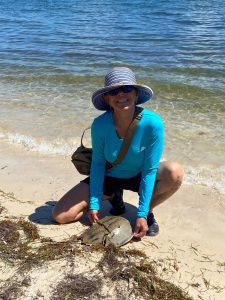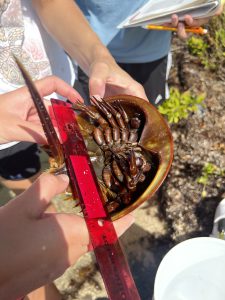Earlier in 2022, the Florida Sea Grant Extension Program in Miami-Dade County launched Florida Horseshoe Crab Watch (FHCW), a program designed to capture data about local horseshoe crab populations. Prior to the expansion of this citizen science project, little data existed about the status of horseshoe crab populations in Florida. Horseshoe crabs have substantial ecological and economic importance in our state. These prehistoric arthropods highly resemble their original ancestors and are sighted on low-energy beaches around the state. Miami-Dade became the 20th county to join the FHCW program.

In partnership with Berlynna Heres, the FHCW statewide coordinator at Florida Fish and Wildlife Conservation Commission’s Fish and Wildlife Research Institute, we hosted two training events and submitted the permits to survey and tag horseshoe crabs in Miami-Dade County. Permits from regulatory agencies are required not just for the collection of scientific information, but when handling live animals. To maintain our various permits and ensure the highest level of quality in data collection, all interested participants must complete a training course.
After two training events and two seasons of surveys, I am proud to share what we have accomplished:
- 51 volunteers trained
- 37 surveys completed
- 129 volunteer hours donated
- the first ever tagged horseshoe crabs in Miami-Dade County!

Volunteers found three unattached individuals (2 male, 1 female), and one mating pair. The rules are that whoever discovers the crabs get to name them, so be on the lookout for Frank, Bob, Virginia, and Frida & Diego (featured in this blog pieces’ banner photo) roaming the waters of Miami-Dade County. If you spot one of these crabs (you’ll know b/c of their tag), please report the sighting here.
The success of this program would not be possible without the enthusiasm and dedication of the volunteers. Berlynna and I extend our most sincere thanks to you.
If you are interested in learning more about FHCW or would like to participate in 2023 training and monitoring, please contact me at: azangroniz@ufl.edu.
 1
1
